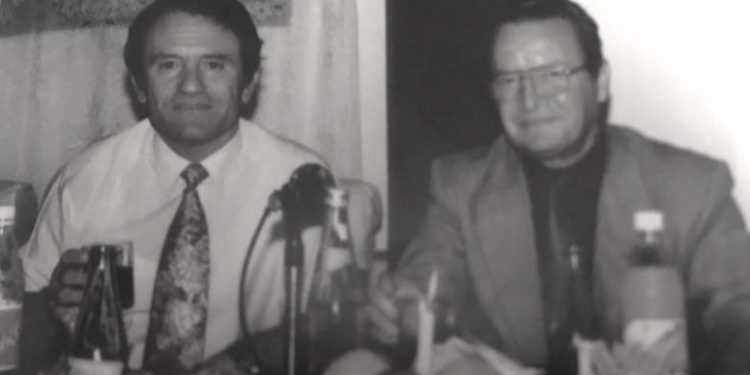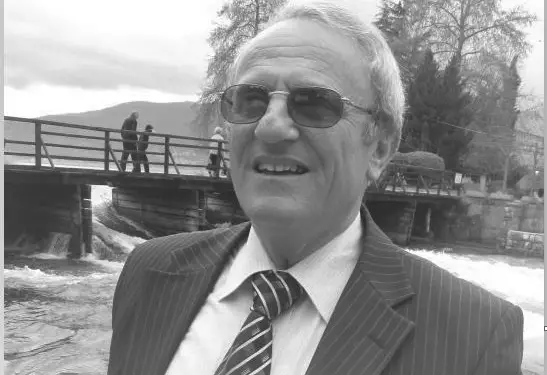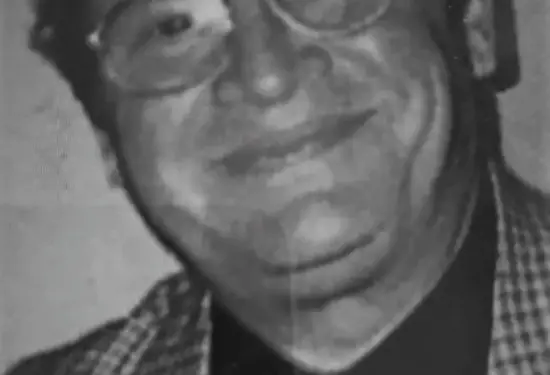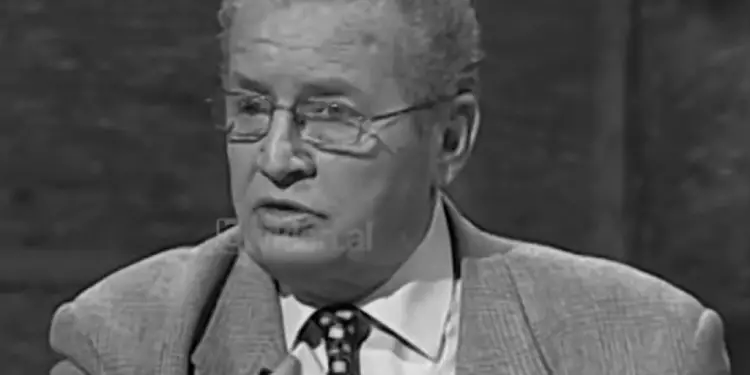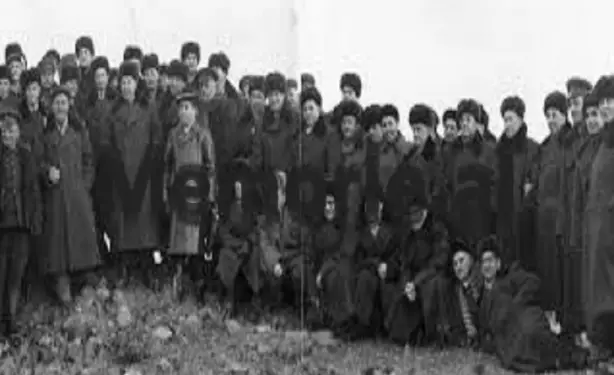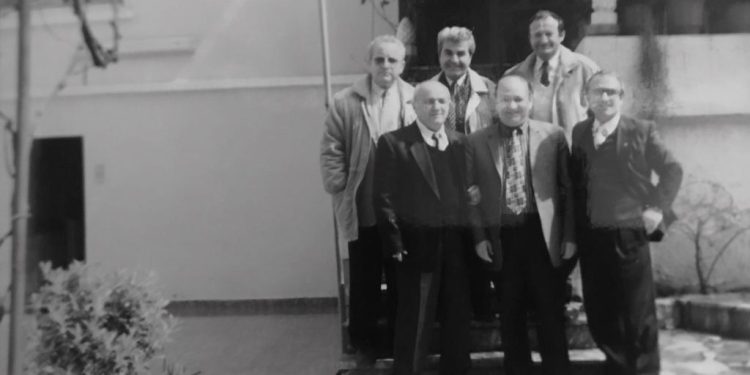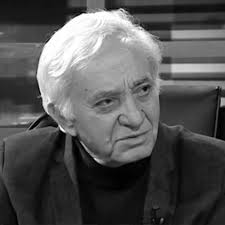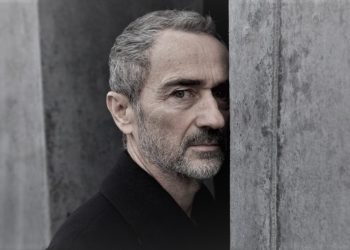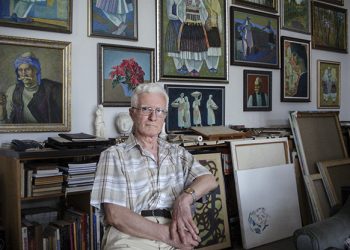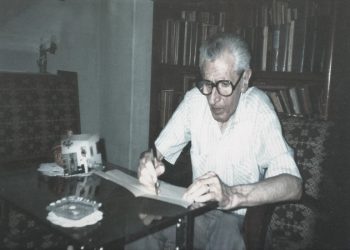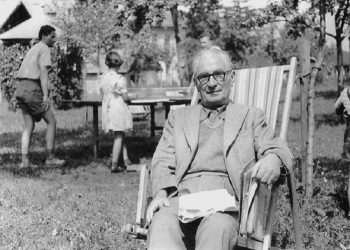From Shpendi Topollaj
The fourth part
Memorie.al / When the symbols of communism, after half a century of struggle, collapsed, there was such a loud noise that we woke up from our deep sleep. We opened our eyes, but not all of us believed what had happened: often, as a person sees some dreams that he takes for truth, he also sees some truths that he takes for dreams. Moreover, there were not a few who opposed this historic upheaval, with demonstrations and even threats. To overcome this situation, patience and wisdom were needed. We were brothers. As such, we had an intellectual, moral and spiritual duty to denounce the demagoguery of communism and the monstrous crimes of the red inquisition. Of course, the most reliable were those who had languished and suffered in prisons and exiles. Silence would really be a great sin of theirs…!
Continues from the previous issue
POETICAL MEDITATIONS OF THE CAPTURED OFFICER
The book “Metaphors of pain” by Gjergj Titan
Fully worthy of the name and surname it bears, in Gjergj Titani, a mirror of his titanic indomitable soul, is the physical portrait. With a face that expresses determination and will and with a well-connected body, you seem to have encountered him in those marble reliefs, dug out of the ground, which were discovered in the country of Pergamum (city in Asia Minor), at the end of the 19th century, present the gigantomachy, i.e. the myth about the war of the gods with the giants. And this is how the life of this outstanding soldier went, who announced in “I do not want the freedom of the Gods”:
“I don’t want the freedom granted!
Oh, I earn it, oh, never a beggar!
My thirst for him never went away:
Oh, I win it, oh straight to the grave”!
This eternal struggle had led that great philosopher to the sentence: “Freson its nights, Frey warden its der Himmel!” (Being free is nothing, becoming free is heaven itself). It seems unbelievable, but fate took Gjergj Titan by the hand when he was very young and took him after his parents, on the paths of the fight for freedom. Being surrounded by hunger, suffering and gunshots, being an eyewitness of historical events, even though he was much younger than the “Son of the Regiment”, he received his first education in the mountains and there began to form his strong character. After the liberation of Albania, by right, the “Skënderbej” Military School was chosen for Gjergji.
From her bosom emerged not only outstanding cadres for the army, but also famous poets. Undoubtedly, in this wonderful and glorious school, Gjergji’s poetic talent was born. The one who stood out for high results in lessons, for inclination in several branches of sports, was also equipped with a sensitive poetic spirit, respect and gratitude for teachers and disagreement with injustice. Especially for this last quality, he is remembered by all those who studied and worked with him. After completing his higher studies abroad, Gjergji belongs to that generation of officers, who put all their skills, culture and being at the service of the army’s combat preparation and its modernization.
Gjergji would never get out of his mind, the images of the partisans who fell for their homeland, their undying enthusiasm and the efforts of his mother to save the lives of these young boys, in the partisan hospitals. He felt happy with the heroics of those years, so he believed in the future, as an honest idealist believes. He dedicated everything he had to this future and this ideal and with his hard work, he made a very good name, in the whole army, until precisely for this he suffered, as many, many other idealists had suffered before him. . The bloody hand of the dictatorship hit everywhere, and the army had no way to save it. Enver Hoxha went to the bullet and imprisoned all the generals, precisely those who had fought the war and had opened the way to power for him.
In this atmosphere of fear and terror that reigned in the people and the army, not even Gjergj Titani was spared, that “little partisan”, who had gone after his family in the mountains and who was known personally by the entire top leadership of the country. In that regime, great wonders were created, which even the most developed imagination could not grasp. In May 1972, after the successful completion of an exercise in Durrës, I saw the dictator, in the presence of the members of the Political Bureau and the leaders of the Army, cover Gjergji with kisses, congratulate him and raise him to the sky, with superlatives. But it wasn’t long before the crackdown and then the imprisonment of this wonderful, forward-thinking, independent officer began.
At that time, the poet Trifon Xhagjika was shot, in the prime of youth and creativity. By handcuffing, shooting, interning and demobilizing the main cadres of the Army, the party-state committed perhaps the greatest treason against the motherland. The spit of shame remained forever on her ugly face. No one believed the fairy tales that were made up for them, as they did not believe that George, who was imprisoned in the medieval prison of Burrell, which reminded him of the labyrinth of Crete, which was created for the Minotaur. And they were right: behind the thick and cold walls of the cells, Gjergji’s heart experienced freedom. Now that he was gone, he felt that she was the most precious thing of man. That’s why he chose it as a leitmotif, when he saw that the lava of the soul was taking the form of poetry.
It is not excluded that poems were written by Gjergji even before 1977. We are sure of only one thing; his poetic peak, he reaches in the long prison years, where he could not breathe, surrounded by barbed wire. Life in prison is very poor. There you don’t know who to turn to, to open your heart! There is also a lack of scenery, or rather; there is only a gloomy appearance, a world of mice and spiders. And if a corner should happen to be found, from which an oak can be seen, the prisoner turns to it, confiding to him the sorrow that torments him, and praying to its leaves, that when they fly like birds of passage, they stop at poor mother’s window and tell her that; even if he died, she will watch him from home. In the conditions of complete isolation, the poet is completely disarmed. But he does not give up. He knows that; “our pure blood; He did not go to prison in vain”.
He is not broken by the guards, the humiliating lines, the insults, the bad food, the frosts of the long winter, and that is why he decides to fight, to challenge with what he can. And he remembers that he has a weapon stronger than a rifle: he has the fortunate opportunity to write poetry. And this is not a little. He will leave it to the generations who did not live the pain, who did not live the prison and the dictatorship of Enver Hoxha, among the poems, authentic documents, with a very high degree of reliability. He now understands that this way, more than ever, he can serve his country. Gjergji does not do word acrobatics with his poems. Looking the truth in the eye, he speaks to her as man to man, without batting an eyelash. When he feels the need to talk, he knows how to give life to abstract and invisible things.
For the title of all the poems, Gjergji has freedom. He connects everything with him; that’s how he loves his homeland, which, as he says himself, is never measured by kilometers and hectares, just as he loves the fields and pines, which absorb freedom, watching the sun when it rises and sets, that’s why he always has order, as he states in: …The great roads”, to find in the world, the stolen freedom. Among other things, we investigate in him a tiresome effort by the poet to define freedom, weaving a hymn to it. Here the verses, even when they have a beautiful sound, again, do not seem to fully satisfy him:
“Human feeling, desire,
Fire burning from ancient times,
Albanian flying in space,
FREEDOM”!
For the miracle of freedom, words are not enough: it is life itself and as such it cannot be defined, not even by all human hearts and minds, taken together. When he sees himself powerless, to sing to freedom until the end, as he deserves it, the poet is content with calling in his testament: “Brothers, never trust Tirana”! In order not to go crazy, from being away from people, from friends, from his mother and his son, as he meets with freedom, he gives life to the pain:
“O human pain, you tear of my soul,
Something troubling that made me thinks,
If I could heal your wounds,
I wouldn’t want anything else…
About the hell where they put him, he writes:
Where folly makes the law,
Where anger fights,
Here’s the cell!
Where he sits alone as a monk,
Where you only have beliefs,
This is prison!
Prison solitude is ancient:
Since the world begins, wanders, turns,
A voice, a star, a spark of freedom,
Tens, hundreds, thousands of years,
Fytafyt fought loneliness monsters.
The poet manages to portray until the night:
Witch of nightmares of anxiety and doubt,
Silent sphinx, traps, stealth,
A den where eavesdroppers are trained,
Almighty ruler of wickedness”.
This is the world that seeks to rule over a great and rebellious soul, which finds a way to bring near and communicate with imagination, full of friends and good friends. You read these sentimental poems and you come to ask yourself: “When Gjergji and his friends suffered the horrors of prison and thought of us with such longing and love, what about us, their friends, did we properly do our civic duty towards them, did we dare the end, so that our conscience does not kill us today, to oppose the dictatorship”?! The poet shows his love for his friends even when he dedicates a poem to the honorable admiral Abdi Mati, this son and father of the Navy, who was so much like the sea, even when he does not forget the simple sailors he calls:
“O my seafaring friends of youthful years,
How do you like the white and blue striped blouses?
The beret string danced so merrily,
A whole sea in your chest, you were blue”!
In his youth, Gjergji himself wore the beautiful uniform of a sailor. The love for him, which is connected with the love for Albania. He created and created sincere youthful dreams, but these were seriously injured. They wounded him, but they could not kill him. In the meaning of these poems, you can see the unquenchable desire to be the defender of the homeland, as if he is ready to forget everything he worked for, just to join the soldiers of the polygons. This seemingly pure and strong desire is not only understood by those who have worn a military cap since childhood, but also by those who read the poem of 1980 (that is, written in prison), with the title; “From your sinful bosom”, where it says:
“I am not your prodigal son, and I have not sold my honor.
I am one of your good sons, Mother!
In the mountains as a child, you snored tiredly,
Battered and bleeding as he often saw me”.
Or the verses from 1985 (in prison), with the simple title “Sazani”, where we see loving reflections of the years when he served there as a young officer. The poet expresses his eternal love for the army, to which he devoted his whole life, in the poem written on July 10, 1983 “We gave you youth”, where he writes, among other things:
“We were left with youth in the green forests,
In severe trials with the soldier brothers,
And we wrote the poems, on kondak, on some sheets
Polygones for our friends of the same age”.
The poet is aware that the anger and revenge of the regime is not only against him. It hits everywhere, and mainly chooses the best, as he himself says, in the poem dedicated to General Abaz Fejzo, which in all honesty, he hastens to call him with the pain of death, with an epithet that is probably acceptable, only for prose; thinker! Convinced that his fate is the same as that of thousands and thousands of others and why not, even with the fate of the entire homeland, he finds the strength to be spiritually reborn and says: “Dreams, hopes from the ocean of worries, I took them out in verses , I turned them into poems, I filled the poems with metaphors”. Endowed with great spiritual energies, he now seeks; “A longing song that heals every worry”.
And he remembers the desert mother who resembles all the other mothers, who come to the prison doors, with a bleached bag of food in their hands. And he remembers the boy who was left without his father, whom he asks:
“Do you know the problems I removed?
What wounds and worries do I have in my chest?
River memories flood me,
but I don’t hear a word from you”.
And he remembers the beautiful G. G., whose name has remained in his mind, like a boreal enigma, her image haunts his memory, although far, far away, somewhere in the Baltic, there is what remained of the unrepeatable youth. Dictatorships, among other things, also destroy families; they separate the woman from the man, just as they hypocritically proclaim that the family is sacred. He does not express himself openly about this. But, referring to the 32-year-old anti-fascist poet, Miguel Hernandez, in the poem “Cell 1009”, on whose walls, he wrote:
“Brothers, comrades, I never forget you,
Send him some sun and some wheat.”
Gjergji takes the faithful widow of the poet as an example:
“That you had Josefina by your side,
The friend of life, once did not part”.
The others are easily guessed and that’s why his pain is even greater. In prison, Gjergj Titani, as a citizen, as a soldier, as a man, as a son, as a father and as a friend, analyzes his conscience and comes to the conclusion that there is nothing wrong, so he is proud when he addresses his son:
“Maybe they told you,
Your father is an evil man
Son, the conscience of the parent speaks to you,
Your father is noble”.
The poet has declared that he is an optimist in every situation. Now he finds the answer to the question that had been bothering him for a long time:
“Who will wake up the seasons”?
…closing the next poem; “Ballad of age”, with the words:
“But the juices in the wood boil,
And the birds return again,
Shopping on the tree explodes
The seasons renew the new awakening”.
Book of poems; “Metaphors of pain” strengthens our conviction that the poet still has a lot to say, that today there are no narrow concrete cells that kill with their stubborn and cruel silence, the happy sounds of the poetic lyre. We believe in the talent of this poet, who, knowing how to write so beautifully in prison will please us even more now that he is free. As for the reader, we guarantee the poet that we will fulfill his last wish as he requests:
“Songs of suffering beaten with a whip
I will take every friend in my heart for protection”. /Memorie.al
The next issue follows




